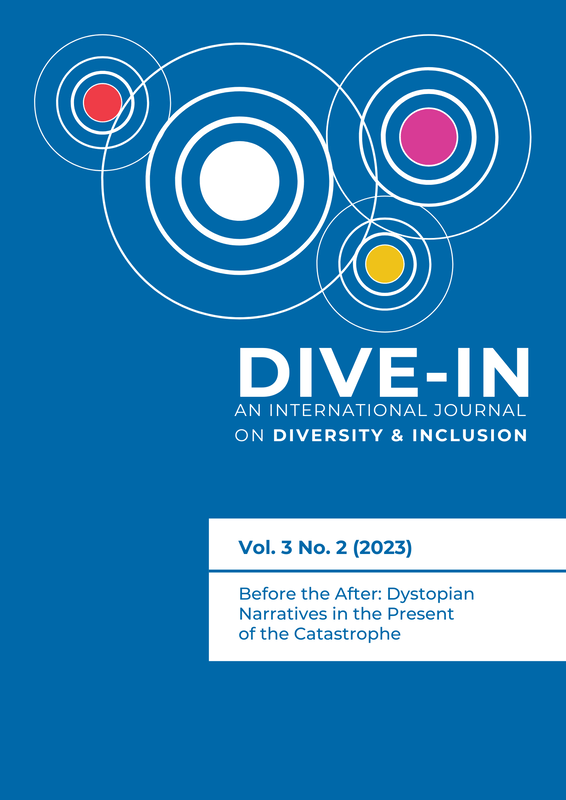Antigone transgenica. Nuove indagini critiche tra genere distopico e mitologia
DOI:
https://doi.org/10.6092/issn.2785-3233/19145Keywords:
myth, Greek tragedy, science-fiction, dystopia, AntigoneAbstract
In the 20th century, it is common to find some rewritings of classical myths set in post-apocalyptic scenarios. The aim of this paper is to propose an innovative research field that combine the study of dystopian literature and myth criticism. The new myth-critical approach considers three social innovations: informatization, which is essential in dystopian literature as well; migration and postcolonial literature, which is linked to the concept of the otherness science fiction thrives on; and finally, consumerism, which leads to eternal technical reproducibility, also presented in the dystopian works, especially in the concept of cloning. A concrete example are the dystopian adaptations of the myth of Antigone: the movie I Cannibali by Liliana Cavani, the epistolary novel In the Country of Last Things by Paul Auster, and the play Antígona Gelada by the portuguese author Armando Nascimento Rosa.
References
Auster, Paul. 2018 (1987). Nel paese delle ultime cose. Trad. it. Monica Sperandini. Torino: Einaudi.
Conti, Valentina. 2020. “Il contagio distopico.” Comparatismi 5, 163–172.
Cuccoro, Corrado. 2018. “I Labdacidi sulla scena portoghese: due drammi di Armando Nascimento Rosa.” Dioniso. Rivista di studi sul teatro antico 8, 217–241.
Do Céu Fialho, Maria. 2017. “Myth and Dystopia: Antígona Gelada (Frozen Antigone) by Armando Nascimento Rosa.” In Carlos Morais, Lorna Hardwick & Maria de Fátima Silva (eds.), Portrayals of Antigone in Portugal. 20th and 21st Century Rewritings of the Antigone Myth, 305–312. Leiden: Brill.
Fernández Urtasun, Rosa. 2017. “La lógica emocional y la tensión entre la ciencia y el mito.” In José Manuel Losada & Antonella Lipscomb (eds), Myths and Emotions, 82–91. Newcastle: Cambridge Scholars Publishing.
Frediani, Federica. 2011. “Riscritture novecentesche dell’Antigone: Questioni di genere e spazio politico.” Manthicora 1, 287–297.
Losada, José Manuel (ed.). 2015. Nuevas Formas del mito. Una metodología interdisciplinar. Berlin: Logos Verlag.
Losada, José Manuel & Antonella Lipscomb (eds.). 2017. Myths and Emotions. Newcastle: Cambridge Scholars Publishing.
Losada, José Manuel & Antonella Lipscomb (eds.). 2021. Mito y ciencia ficción. Madrid: Sial.
Losada, José Manuel. 2022. Mitocrítica cultural. Una definición del mito. Madrid: Akal.
Molina Gavilán, Yolanda. 2002. Ciencia ficción en espanol: una mitología moderna ante el cambio. Lewiston, Queenston and Lampeter: The Edwin Mellen Press.
Mosse, L. George. 1980. Soldatenfriedhöfe und nationale Wiedergeburt. Der Gefallenenkult in Deutschland, Kriegserlebnisse. Göttingen: Vandenhoeck und Ruprecht.
Nascimento Rosa, Armando. 2008. Antígona Gelada. Coimbra: José Ribeiro Ferreira.
Novelli, Giuseppe & Emiliano Giardina. 2003. Genetica medica pratica. Roma: Aracne.
Revermann, Martin. 2008. “The Appeal of Dystopia: Latching onto Greek Drama in the Twentieth Century.” Arion: A Journal of Humanities and the Classics 16(1), 97–118.
Steiner, George. 1995 (1984). Le Antigoni. Trad. it. Nicoletta Marini. Milano: Garzanti.
I cannibali. Dir. Liliana Cavani, Italia, 1969.
Downloads
Published
How to Cite
Issue
Section
License
Copyright (c) 2023 Chiara Protani

This work is licensed under a Creative Commons Attribution 4.0 International License.





